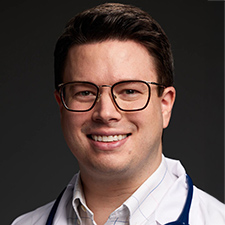“What’s it really like to be a resident here?”
It’s the question that, on the applicant side, is at the heart of every residency interview. Fortunately, many programs offer interviewees a chance to speak directly with current residents on interview day. It’s an opportunity to get perspective from those living the experience every day.
So, how can applicants make the most of these conversations? Haidn Foster, MD, an AMA member and third-year internal medicine resident, recently shared his advice for making these interactions meaningful. As interview season kicks into high gear, Dr. Foster offered a list of questions that can help applicants gain valuable insight on residency life.
How does your program respond to feedback?
The ways in which a program responds to resident feedback can be a key indicator of its culture.
“One of the most important questions I asked during my residency interviews was about specific recent examples of how programs adapted and improved based on resident feedback,” said Dr. Foster, chair of the AMA Resident and Fellow Section Governing Council (AMA-RFS). “The perfect residency doesn’t exist, but the more responsive a program is to its residents, the more perfect it can become for them over time."
How does your program handle night shifts?
Resident physicians often have little control over their work schedules. Still, it helps to know what you are getting into.
“To understand a typical day, I think it’s more helpful to ask about aspects such as the call schedule,” Dr. Foster said.
He suggested asking questions about the specifics, such as whether residents work a night-float system or a 24-hour shift.
Dive deeper:
- What programs, resident physicians are doing to manage fatigue
- How to maximize the power of naps during residency shifts
- 3 tips for new med school grads facing old 24-hour shift
- Are you a sleep deprived medical resident? 4 symptoms to watch for
What do you do outside of work?
Intern year isn’t the time to pick up a new, time-consuming hobby. Nevertheless, asking about how residents spend their precious personal time can give some insight on work-life balance for typical residents.
"Though the ACGME [Accreditation Council for Graduate Medical Education] has instituted resident work-hour protections, it’s worth recognizing that regardless of the program, residency is a long and difficult road," said Dr. Foster, a resident at Penn State Milton S. Hershey Medical Center. "Still, it’s fair game to ask how successful residents spend their time outside the hospital."
How are residents treated here?
Program culture is difficult to assess during interviews, yet it’s vital to a resident’s long-term success and satisfaction.
"To get the fullest picture of an institution’s culture, I would ask how residents are viewed and treated within the residency program and across the hospital," Dr. Foster said.
Dive deeper:
- Meet your Match: Assessing program culture during virtual residency interviews
- Interviewing for physician residency programs
- What residency applicants should know before interviews
- Mastering M4: Top questions for your fourth year of medical school
What would you change about your program?
This question is key to understanding a program’s strengths and weaknesses. The latter topic is likely to require some nuanced inquisition.
“You don’t have to worry about trying to guess what a program perceives as its strengths—communicating strengths is a primary goal of program leadership on interview day,” Dr. Foster said.
“Learning about areas for improvement, however, may take some more digging. Feel free to ask residents about what they’d change about their program; most will happily give you an honest answer.”
How does this program support resident well-being?
“More important than how any individual residents handle burnout is how a program supports its trainees to avoid and deal with burnout,” Dr. Foster said. “Residents should be able to identify how the program has supported their colleagues through difficult times as well as initiatives and activities to help residents avoid burnout in the first place.”
Dive deeper:
- When should you expect physician residency interview invites?
- How to address a medical school misstep in residency interviews
- These are the interview questions M4s should prep for





